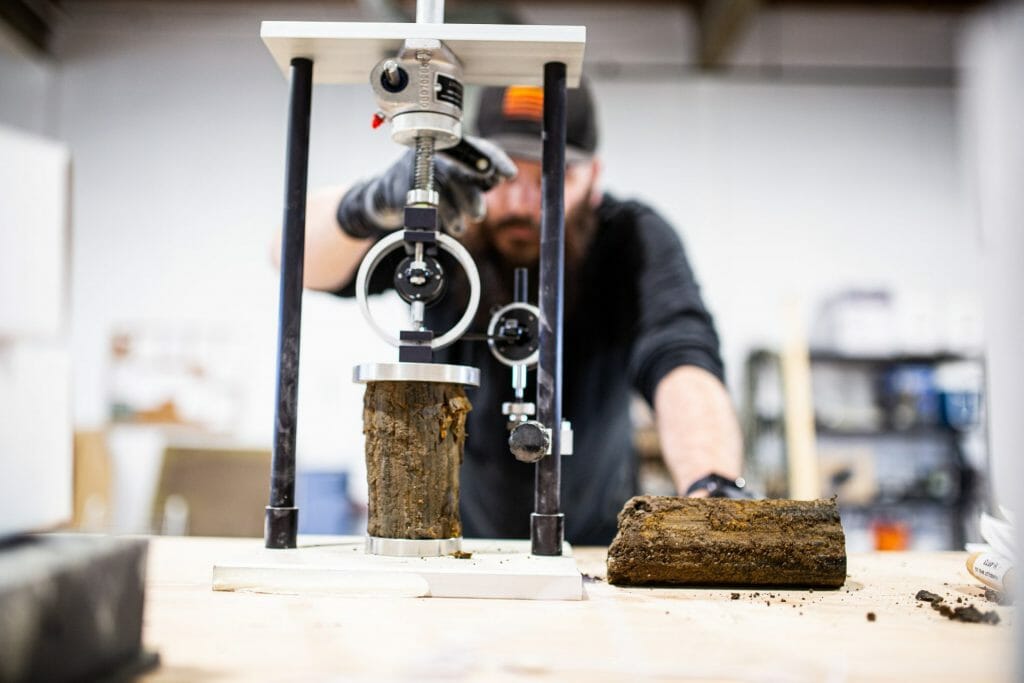You know from our previous blog posts and website that geotechnical testing is important to complete prior to any completing any construction or foundational changes, and that ProtechGeo is a prime choice to complete the testing, but what exactly is Geotechnical and Materials Testing?
Geotechnical testing is a process of evaluating soil and rock properties to determine their suitability for construction and engineering purposes. There are various types of geotechnical testing, each producing different types of results.
Some common types of tests are shown below:

- Soil Classification: Soil classification is used to categorize soil types based on their physical and engineering properties. The classification system used varies based on the country, but rest assured that ProtechGeo uses the most comprehensive classification required for your site.
- Soil Properties: Geotechnical testing is also used to determine various soil properties such as shear strength, compaction characteristics, permeability, and consolidation characteristics. The results of these tests provide valuable information for designing foundations, retaining structures, and other earthworks, which is why it’s imperative to get this information in front of your structural design team as soon as possible.
- Rock Properties: Geotechnical testing is also used to evaluate the properties of rocks, including strength, deformation, and durability. This information is useful for designing rock support systems and evaluating the stability of rock slopes, which is especially important in places like near the Edmonton’s river valley area.
- Groundwater Properties: Geotechnical testing can also be used to evaluate groundwater properties, including water pressure, permeability, and water quality. This information is useful for your civil engineering team for designing drainage systems and evaluating the potential for groundwater-related problems.
- Geophysical Testing: Geophysical testing involves using techniques such as seismic refraction, ground-penetrating radar, and electrical resistivity to evaluate subsurface conditions. These tests provide information about soil and rock layers, the presence of voids, and other important characteristics. While not every test may be required for your site depending on the location, it is important you are work with an experienced testing team like ProtechGeo to determine what tests should be conducted and how the test will save you any headaches in later design phases.
- In Situ Testing: In situ testing involves testing soil and rock properties directly in the ground, rather than in a laboratory. Common types of in situ testing include standard penetration tests, cone penetration tests, and pressuremeter tests. At ProtechGeo, we have access to the equipment required to complete tests onsite, and in our local lab and will work with you to determine the best solution for your site, requirements and budget!
- Laboratory Testing: Geotechnical laboratory testing involves testing soil and rock samples in a laboratory setting to determine their properties. Common tests include triaxial compression tests, direct shear tests, and unconfined compression tests. As mentioned in the previous point, our lab is located in central Edmonton, and staffed with experienced, knowledgeable technicians to ensure your results are accurate and detailed.
The type of testing used depends on the specific project requirements and the subsurface conditions. It’s important to use the appropriate testing methods to obtain accurate and reliable results, and work with design and construction firms who also see the value in these results. ProtechGeo & Material Testing has decades of combined experience to assist you with not only performing the required testing, but also guiding you through what tests are required for your site, and when to perform them to help our clients to get the best possible results for your project, right from the beginning.

